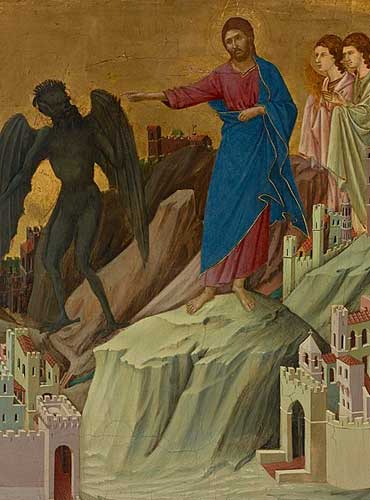Thursday of the Third Week of Lent – Lk 11:14-23
Today’s Gospel from Luke comes immediately after Christ tells His listeners that they’ll receive what they ask for in prayer. In verse 13, Christ tells them “If you then, who are wicked, know how to give good gifts to your children, how much more will the Father in heaven give the Holy Spirit to those who ask him?” As a sort of follow-up, He shows the power of that Spirit, since, as Saint Cyril of Alexandria points out, the Holy Spirit is called “the finger of God.”
There are at least two lessons we can take away from this Gospel and apply to our lives: first, the need to see all things as coming from God’s loving hands, and, related to this, to remember that God is always the one in charge.
The crowds in today’s Gospel clamored against Jesus, crying that His good deed was actually the work of the devil. In our lives, we don’t usually attribute the things that happen to us as diabolic, but there is always that temptation to complain or to reject some suffering or tribulation, as though it didn’t come from God. Yet, as Saint Claude de la Colombiere wrote to a directee: “How foolish [it is] to wonder if your troubles come from God! Where else could they come from? Does anything on earth happen without his order or permission?” Our response must be, in the words of Saint Alphonsus Ligouri, to “must unite ourselves to God’s will not only in things that come to us directly from his hands, such as sickness, desolation, poverty, death of relatives, but likewise in those we suffer from man—for example, contempt, injustice, loss of reputation, loss of temporal goods and all kinds of persecution. On these occasions we must remember that while God does not will the sin, He does will our humiliation, our poverty, or our mortification, as the case may be. . . . Let us then abandon everything to God’s good pleasure, because being infinitely wise, he knows what is best for us; and being all-good and all-loving—having given his life for us—he wills what is best for us. Let us, as St. Basil counsels us, rest secure in the conviction that beyond the possibility of a doubt, God works to affect our welfare, infinitely better than we could ever hope to accomplish or desire it ourselves.” We can ask ourselves: how well do we unify our wills with Christ’s? Do we see all things as coming from His hands?
Secondly, the Gospel reminds us who is really in charge in the world. Some scholars have pointed out that the name “Beelzebul” means “lord of the dwelling,” the one who is in charge of the home, and we see this meaning reflected in the imagery that Christ uses. Satan has some power in the world, where he guards his possessions, but Christ is really the one who is in charge, since the devil only has as much power as Christ permits him to have. Against Christ’s power, Satan is really no match. Christ reminds us of this during the Last Supper discourse: “I have told you this so that you might have peace in me. In the world you will have trouble, but take courage, I have conquered the world.” When we unite ourselves to God’s will, making our wills uniform with His, we’re reminded, especially in the midst of difficulties, that Christ is the one who pulls all the strings, who knows everything, and who orders everything for our good. Although he trusted unreservedly in Divine Providence, Saint Joseph Cottolengo was no stranger to difficulties and trials. Yet, he always remembered that the One he believed in was powerful, and that power was made perfect in the saint’s weakness (cf. 2 Cor 12:9). Speaking to a close friend in private, he admitted, “God, Who is so wonderfully wise and good in His counsels and works, purifies me in the crucible of tribulations and places me on the rack of suffering, which is hard to endure, even though it neither touches my person nor imperils the existence of the Piccola Casa. But such trials are merciful visitations of His love, gentle caresses of His loving hand, and I feel perfectly resigned and contented.” Rather than see them as signs of a lack of love on God’s part, the saint saw tribulations as a manifestation of God’s power, since that power can obtain good even out of the greatest evils. We can ask ourselves, are we convinced of this truth, as Cottolengo was?
Let us ask, through the intercession of Mary, Our Lady of Sorrows, for the grace to find our peace in Christ, and to have a providential vision of life, knowing that He orders all things for our good.

The Priestly Beatitudes
I want to speak about one aspect of the mystery




